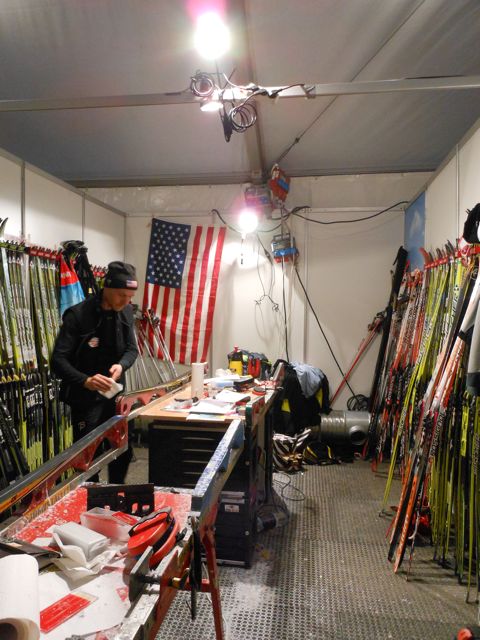
Until last year, the U.S. Ski Team’s service team had a collaborative approach: as FasterSkier reported in 2010, the head technicians for kick and glide, both Swedes, shared responsibilities and neither was the other’s boss.
This fall, that changed, with glide expert Peter Johansson taking over as the head of the service team. A native of Gällivare, Sweden, Johansson was in the spotlight ten days ago when the World Cup opened there to astonishing success by the U.S. women’s team.
“He has really good experience, and we had really good ski testing before the race,” Kikkan Randall said after finishing third in the 10 k skate, the first competition of the season. “My skis felt great.”
It shouldn’t be an unfamiliar feeling for the World Cup Sprint Champion, who has been working with Johansson for years; he’s been the one primarily responsible for her skis. When FasterSkier was in Gällivare for the races, we stepped into the waxroom and chatted with Johansson.
“I was working with a wax company for a few years, and I guess – it’s not a small world, but people know each other, so the head wax tech back then contacted me and asked if I wanted to work with the team,” explained Johansson, who signed on in 2006.
Since then, techs and coaches have come and gone, but Johansson says that the beginning of a new year never causes anxiety; there days, there’s little turnover, so even with his promotion he doesn’t have to worry too much about how responsibilities will be divided up or the dynamics between the servicemen.
“It’s easy,” he said. “It’s such an easy team to work with. It just comes naturally.”
This year, the main changes were the departure of men’s coach Pete Vordenberg and the addition of former Rossignol tech Cory Wubbels (Jason Cork is also the team’s new assistant coach). The fact that the rest of the team is remaining more or less stable, Randall told FasterSkier and a local Swedish reporter, goes a long way towards getting her fast skis.
“Our team of guys is really strong and experienced,” she said. “Everyone has their different job that they do, and so Peter is free to work with me directly on the skis. That has been part of our success too, is that our service team has been gaining experience and getting better every year.”
Before joining the U.S. team, Johansson had worked at Skigo, a company based in nearby Kiruna whose waxes are gaining in popularity in the U.S. He only works on skis during the World Cup season, and the rest of the year he still works at his other former jobs.
“A part of the summer I usually work at my old job at the hospital – I was a biomedical engineer there,” Johansson said. “And part of the summer I work in the mine. I have a little bit of this and that.”
Mining and ski waxing might seem like a strange combination, but LKAB, the iron mine that has magnetite fields in Kiruna and Gällivare, controls much of the economy of the region. Part of its 31.12 billion Swedish crowns in revenue – $4.7 billion in American currency – were reinvested in these very World Cup races, which LKAB sponsored. It was that company’s name that appeared on racers bibs.
As for the biomedical job? Okay, that’s a pretty strange trio.
“It’s fun,” Johansson laughed of his many occupations.
In the fall, he starts testing waxes and grinds a few weeks before the season, although he was unsurprisingly tight-lipped about what that actually entails. The service team doesn’t meet up until the rest of the team arrives in Europe.
Although Randall said that she felt like having a Gällivare native waxing her skis gave her a bit of a home-field advantage that opening weekend, Johansson deflected the question.
“I guess I should, maybe,” he said of whether he knew the snow here better than other techs. “It’s the same snow [everywhere]…. but being here makes the travel days less, so that’s a big plus, and it’s also nice to be in my hometown and be with my family for a couple of days.”
When asked how Johansson helped them out in Sweden, Jessie Diggins had a different answer.
“He’s a great translator!” she told FasterSkier.
To Randall, the job that Johannson did in Gällivare was the same as the one he does every weekend: to give her great skis.
“Peter has been working really hard for us, we really appreciate the time he has spent on the road away from his family, so it’s really cool to be able to have some good results here in his hometown,” she said. “He should be a little bit of a local celebrity now.”
It seems like he was. Noah Hoffman blogged about seeing an article in the local newspaper featuring Johansson as the U.S. team’s “miracle in Gällivare.”
“I think he’s one of the best wax techs out there,” Randall said.
Chelsea Little
Chelsea Little is FasterSkier's Editor-At-Large. A former racer at Ford Sayre, Dartmouth College and the Craftsbury Green Racing Project, she is a PhD candidate in aquatic ecology in the @Altermatt_lab at Eawag, the Swiss Federal Institute of Aquatic Science and Technology in Zurich, Switzerland. You can follow her on twitter @ChelskiLittle.



